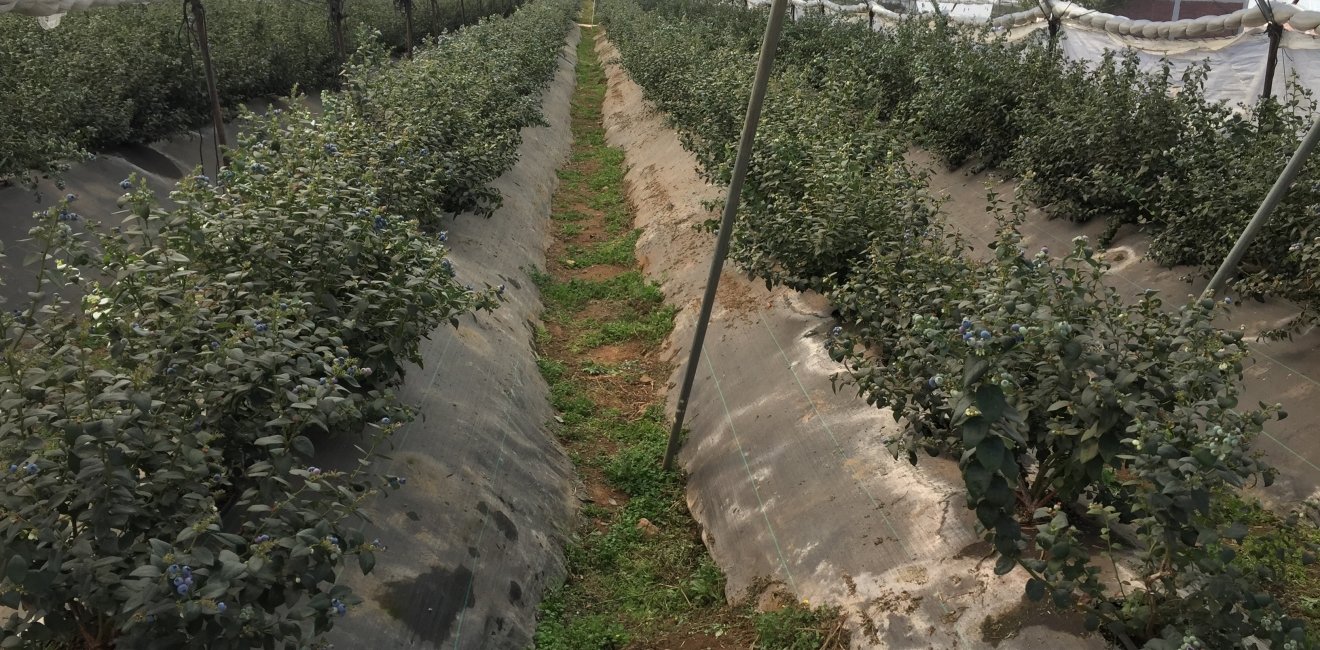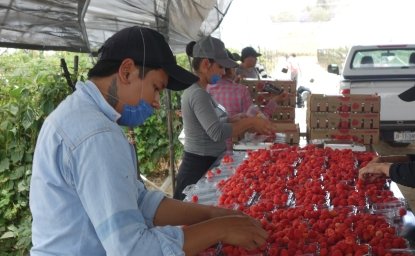Case Study: Felicitas
This case study is a part of the Mexico Institute's project "Farm Labor and Mexico’s Export Produce Industry."
This case study is a part of the Mexico Institute's project "Farm Labor and Mexico’s Export Produce Industry."

Felicitas Xoquet González is 47 years old. According to her grandparents, the name Xoquet is Náhuatl, but she does not speak that language. She is originally from Cuichapa, Veracruz, but she has lived for the last four years in Sayula, Jalisco. In Cuichapa, she and her family worked on the San Nicolás sugar plantation, but, she says, “there is no life there. Yes, there’s work, but they pay very little. For a whole day they pay you 100 pesos, 120 pesos.” Her father has a plot of land where he grows Iberia coffee, but production is inconsistent: not every year brings a harvest, so it does not provide the family with a dependable income. “He has a little piece of land where he grows coffee,” she explains, “but you don’t get much from it. He says one year there’s coffee, the next year nothing. This year he got nothing, not a single coffee bean.”
Felicitas got married in Cuichapa and had her first child at age 17. One year and eight months later, she had another. There were times when her husband did not return from his work growing chiles: sometimes months went by without seeing him. “My husband worked in the chile fields and was gone for months, he didn’t come home,” she says. When he was not at home, she had to support her children: “I went east, like from here to Sayula. I went there and worked with people . . . to wash dishes, to do cleaning and stuff, and that’s how I made some money to buy something for my children, because there were two, I mean, there are two.”
When her children were approximately six and seven years old, Felicitas decided to take her children away from her town: “I left my town very soon because I didn’t want my children to suffer the same as I had, that’s why.” She believed that if she waited for her husband he would only give her more children to support: “I got mad at him and said ‘Oh, why should I wait around for him to . . . then I’ll have another kid, and another, no, no, no.’ I said no, and I came to . . . I went to Sinaloa.” The farm where she worked, cultivating string beans, chiles, tomatoes, onions, eggplant, and tomatillos, had a daycare center for her children and also health insurance, but the company no longer exists.
From Sinaloa, Felicitas went with her children to La Paz, Baja California, where she worked in the fields cultivating tomatillos and chiles. Her children were now older, and they went to the CONAFE school located in the fields. One of her children learned to read, but the other did not. There they had medical insurance and lived in a dormitory in the fields. Later, she returned to Sinaloa, but it was not as “nice” as before, so she went to Ensenada to work in the cilantro, tomatillo, radish, strawberry, and vegetable fields. From there, she again went to Sinaloa, and then to Sayula, Jalisco. In Sayula, she went to work in the Bonanza tomato fields, but she did not like working there because the bosses were very strict and did not pay well. A woman who worked at Berries Paradise suggested that she apply there, and she has now been working in the raspberry fields for four years.
During her migrations, Felicitas met a man from Palomares, Oaxaca, and the two started a relationship. “I found someone,” she says, “and yes, we talked and everything, and I was alone and so was he. And there I was, we went out, and eventually decided to get together. And now I have another child.” They had problems registering the child and getting his birth certificate because when her partner worked in the vineyards in Hermosillo, there was a fire in the dormitory and he lost his documents, including his own birth certificate. Without a birth certificate for their son, he could not be enrolled in school, and he was left behind. They could not get the birth certificate until her partner could travel to Oaxaca to get a new copy of his own. By that time, their son was ten years old. He had gone to classes in the fields, but he was not formally enrolled and could not receive a diploma. He is currently studying in the “open school,” where they give him books, he studies at home, and eventually he will take an exam. Felicitas sees in him the ability to study computers and drawing; she hopes to send him to classes to develop his “potential.”
Felicitas and her partner have now been together for 15 years. He has read books on veterinary medicine and learned about animal care; he now takes care of roosters and gives them vitamins. When he was working in Sonora, he had an accident: he tripped on a rope getting onto a horse trailer and fell, injuring two vertebrae. He can walk but not bend over, and he is sometimes in pain.
Felicitas says her current job in the raspberry fields of Berries Paradise in Sayula is better than her previous jobs. She gets along well with her bosses, the pay is good, and it increases when there is a lot of fruit: she can make more then 3,000 pesos a week at harvest time, but less than 2,000 pesos at other times. She has social security, but has registered only her son because she and her partner are not legally married; he goes to the Seguro Popular clinic, especially when he is in pain. She is not sure whether she has Infonavit home loan assistance, but she hopes one day to buy a small plot of land in Sayula. Her jobs in Tijuana, Ensenada, and Sinaloa paid much less and the rent was expensive; she also believes that those jobs would no longer hire her because of her age. “At my age they wouldn’t take me,” she says, “because I’m 47 now, and they want workers younger than 45. When you’re older than 45 they don’t want you anymore. No, because my brother-in-law, my partner’s brother, is a contractor, and when he’s going to take people to Oaxaca, to Veracruz, and to Chiapas, they tell him not to bring older people.”
Felicitas lives in Sayula, behind the Coppel store, with her partner and their children in a rented house. She says they have no problems with the neighbors because they hardly ever see them; she spends almost all her time working. When she gets home after work, everything is clean and sometimes there is even a meal ready: her son or her partner takes care of that—her partner when he is well, because sometimes his back pain is worse. She also does some housework when she is at home, but with the help from her family, it is less than it would otherwise be.
Recently, last March, her father, mother, brother, and sister-in-law came to live with them. Her father and brother work with her in the raspberry fields. Her mother cannot work because her knees are bad, and her sister-in-law must stay out of the sun because of a health problem, so, for the moment, they stay at home. Her father and brother previously worked on the sugar plantation in Cuichapa, but they were paid very badly in the last harvest, and so they came to Sayula to work for the same company as Felicitas. This is the first time they have come to work there; their older children also work in the same place, and all of them have contracts.
Felicitas says her brother compares the jobs he has had by saying that he goes to the berry fields clean and comes home clean, but he used to go to the sugar cane fields clean and came back “all black.” She says her father is very hard-working, committed, and thoughtful, that he likes to work all the hours he is supposed to, without getting distracted; he is an example to her of how older adults should continue working. “The bosses are crazy,” she says, “because older men work more than a kid, a kid doesn’t care, he sits around, but an adult works a full day. I’ve seen older men here and that’s how they are, they don’t stop all day, they work and work, and my father is one of them.” She has arrived at this conclusion not only because of her father, but also because of other men she has worked with.


The Mexico Institute seeks to improve understanding, communication, and cooperation between Mexico and the United States by promoting original research, encouraging public discussion, and proposing policy options for enhancing the bilateral relationship. A binational Advisory Board, chaired by Luis Téllez and Earl Anthony Wayne, oversees the work of the Mexico Institute. Read more



